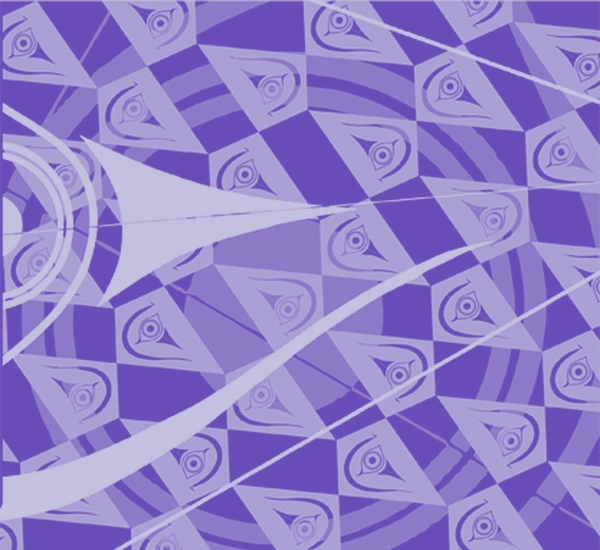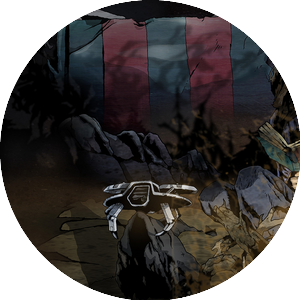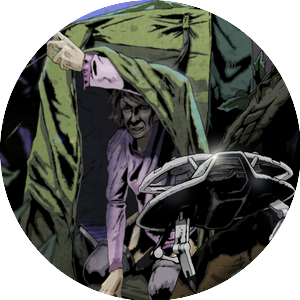Inspiration
After I’d submitted the final draft of The Albino’s Dancer to Telos, I was thinking about anything else I could pitch to them now I had a relationship. The Time Hunter series was already cancelled, so it couldn’t be another of those, and Telos were more known for their factual books than their fiction. For reasons that are hard to understand, I decided that I would pitch them a history of UK Hip Hop: I had been a fan of it since my teens, and I knew there was a gap in the market for such a book. I think I knew it was unlikely they’d take it, but I felt a strong pressure to capitalise on the fact that I could pitch something straight to Telos without actually having anything suitable. Unsurprisingly, they turned me down, but the idea of a book about UK Hip Hop stayed with me, and indeed is something I’d still like to do.
Years later, just before I wrote my Black Archive on The Talons of Weng-Chiang, I sat down to rewatch The Greatest Show in the Galaxy and realised that the story served as a pretty strong allegory for 80s Doctor Who. At the time, I made a snarky comment in a WhatsApp chat and moved on, but in the back of my mind the idea that I’d thought of something I hadn’t seen anyone else say stuck. While I was writing my first Black Archive, the idea came back to me, and along with it the realisation that the rapping Ringmaster made The Greatest Show in the Galaxy pretty much the only story in Doctor Who’s long history where you could legitimately talk about the history of rap in the UK. It wasn’t quite enough for a whole Black Archive, but it was a start.
The Pitch
I decided to rewatch the story, looking for anything else that could make a chapter. For a Black Archive, I like to have five chapters that talk about different things: 80s Who and UK Hip Hop were two, so I needed three more.
Clowns were the obvious one, because - as with the rapping Ringmaster - the story was one of the few places in Doctor Who where you could really talk about them. My fourth was the planet Segonax, one in a long line of Doctor Who quarries but used slightly differently in The Greatest Show. The fifth wouldn’t come, though, until I remembered an article I had written in my teens for Celestial Toyroom (the magazine of the Doctor Who Appreciation Society) called The Magic of Doctor Who: the article had been written in a rush in response to realising the Doctor says magic doesn’t exist in the Daemons but does in Battlefield, and had nothing more to say. I’d always been a little embarrassed about it, but The Greatest Show - with its resolutely unexplained werewolves, zombies and gods - would be the perfect place to try again. This gave me my five chapters, and an inkling of an overall topic that they all linked to: Andrew Cartmel’s reinvention of the programme laying the foundations for Russell T Davies’ revival of Doctor Who.
I jotted down rough notes for each chapter - a few lines for each point in each chapter - and emailed them to Philip Purser-Hallard as a pitch for another Black Archive. He emailed back to say he liked the idea but would need to talk it through with the other editors, and I got back to finishing my first Black Archive.
Getting the Story
After The Talons of Weng-Chiang had passed its final edit, I reminded Philip about my other pitch. He raised a query about the chapter on quarries: why should that chapter specifically be in a book about the Greatest Show? To be completely honest, I hadn’t thought about it too hard, and had just been thinking that there would be plenty to write about in a chapter about Doctor Who and quarries. Being asked about it, though, clarified why I thought it fit: Cartmel’s era rarely used quarries and instead preferred to set its stories on Earth. Segonax though wasn’t just a standard Doctor Who gravel pit planet that one of any hundreds of stories could be happening on: it was an actual character in the story, with a history and a role to play in the overall theme of the story. I explained this to Philip, and satisfied with the explanation the book was commissioned.
As with Talons, I was told that my editor would be Obverse supremo Stuart Douglas. As with Talons, I knew there would be a lot of reading to be done. But I also wanted to push myself out of my comfort zone and actually talk to some people. Having just written a story for Obverse’s Paradise Towers short story series, I knew Stuart was in touch with Stephen Wyatt, the writer of The Greatest Show: I asked him for an introduction, and got some useful paperwork and an interview in return. I also knew I wanted to make some points about Ace, so I asked Stuart if he had any contact with Ian Briggs, her creator: that resulted in another introduction and some more paperwork.
But I was also thinking about that chapter about UK Hip Hop. I already knew there wasn’t a lot of good source material on its history, and having someone who had lived through the birth of the scene to talk to would be very, very useful. When I was a teenager, one of the first UK artists I had listened to was a rapper called Blade. He was incredibly well-respected in the industry, firstly because he always did was he could to help other rappers out in the belief that a rising tide lifts all boats, but also because he had remained an independent artist throughout the majority of his career: he recorded and pressed his own records, selling them directly to the fans on the streets of London or by mail order. There were even stories of him ringing up fans who included their telephone numbers in their orders and chatting with them: the friend of my brother’s who had got us into UK Hip Hop swore blind this had happened to him, but we never believed him. Blade had been retired for several years by the time I was writing my Black Archive, but had just launched a UK Hip Hop YouTube channel that included contact details. Thinking “what the hell”, I sent him an email and was surprised to find myself on the telephone with Blade asking him about Derek B and Rico Ross’ rapping. I suspect I owe my brother’s friend an apology.
Writing the Story
I’d set up a way of working when I was writing The Talons of Weng-Chiang that I’d found pretty useful: instead of trying to write a chapter from beginning to end, I wrote the book reference to reference. As I read a reference source, I would write the paragraphs they related to wherever they fell in the book: so for something like the interview I did with Stephen Wyatt, I ended up with paragraphs and quotes scattered across the entire book, some of them alone in the chapter. It seems like an odd way to work, but I found it meant I didn’t have to retain huge amounts of research in my head, and meant I didn’t lose any points as I went through. It made editing slightly harder - because I had to make sure paragraphs that were written months apart flowed into each other and looked like they were making a single, sustained argument - but it felt like the right way to do it.
Sometimes, the research would pull the chapters in completely new directions. I knew I was going to talk about psychogeography in the chapter about quarries, and so I was always going to mention Alan Moore, who had written From Hell as a psychogeographical story and had also been a big influence on Andrew Cartmel. As I read more about Moore, however, it struck me that there were strong parallels between the way Moore reinvented outdated comic book heroes and how Cartmel had approached Doctor Who. Moore became central to the quarries chapter, and muscled his way into the chapter on Cartmel’s use of myth and magic as well.
There was a lot of research to be done, but I found that my method meant I was getting words down remarkably quickly: almost before I realised it, I had a first draft of the whole book ready. Although I didn’t have a fixed deadline or a place in the Black archive schedule, I submitted the draft to Stuart Douglas and moved on to other things.
Editorial
As sometimes happens with the Black Archives, a need had arisen to rejig the schedule a little. This left Obverse with a gap for the August 2023 slot, and my Black Archive was the one that was closest to being ready to publish. Because of this, Stuart Douglas started his edit almost as soon as I sent him the first draft, but I was confident that the process wouldn’t be too problematic: Stuart had edited The Talons of Weng-Chiang and the process had been swift and smooth, with Stuart confiding at one point that it was the Black Archive he’d raised the fewest editorial points with, and that included ones he wasn’t specifically the editor for.
This time, however, I wasn’t so lucky.
Stuart picked up a problem with the tone of how I compared Alan Moore with Andrew Cartmel that I’d inherited from the source material I was using: in a lot of the reference works, Moore was presented as being the epitome of what a writer should be, and the word “lesser” got used a lot to describe the writers who came after him. This was easy enough to fix, and gave me the opportunity to shore up my argument that Cartmel was using Moore as a blueprint for how to reinvigorate Doctor Who. The bigger problem came in the chapter about UK Hip Hop. It was, you might be surprised to hear, about UK Hip Hop. In my longstanding desire to talk about the history of rap in the UK, I had forgotten I was writing a book about Doctor Who, and there were long sections of the chapter where Time Lords and TARDISes barely got a look-in. Stuart reckoned that the second two-thirds of the chapter needed a complete rewrite, and given that there was now a tight deadline on the book, we might need to reconsider that August publication date.
But, as someone once said, the moment had been prepared for.
I’d already guessed that the UK Hip Hop chapter would be problematic, for one main reason: having gone to the trouble of interviewing Blade, I had a strong desire to get as many of his words into the book as possible. Pretty much everything he’d said over the hour we’d talked was transcribed and worked into the chapter somewhere, because I knew fans of the genre would want to hear as much as what he wanted to say as possible. On the whole, it still fit what I was trying to say - but in my heart of hearts, I knew in some places it didn’t, and pretty much everywhere Blade’s contributions could be trimmed to be more succinct. I’d hoped - as writers often hope, against all evidence - that my editor wouldn’t notice what I had and the original version would be accepted. As soon as Stuart objected, I knew I could make the chapter stronger and more focussed by reducing the amount of quoting.
The other problem Stuart saw - that the chapter was too much about UK Hip Hop and not enough about Doctor Who - also seemed like a fairly easy fix to me. I had written the chapter with the idea of the reader making the connections with Doctor Who themselves from the way I talked about the music and the people who made it. Whilst there were digressions that were more of interest to me than a more general audience, I thought I could also bring the chapter into a tighter focus by dropping a few hints here and there about where I thought the connections were. I reworked the chapter fairly quickly along those lines, addressed a few other points, and resubmitted it.
Stuart agreed, and the book passed over to Philip Purser-Hallard to do a second edit on, and with a few more changes we were done. The final edit was made when I emailed Stuart a few days later to accept that I was being stubborn and that the objection both editors had raised about a reference to a B-Real interview was valid: the interview happened to be on Joe Rogan’s podcast, and the point I was making wasn’t vital enough to risk sending even a single person in that direction. After telling both editors it was fine, I apologetically conceded the point after Rogan hit the news again for spreading misinformation about vaccines.
What Happened Next?
After being a little fearful about what the release of my last Black Archive might bring my way, this time I feel like I’m getting the full experience: there’s some proper anticipation of what I might do in a Black Archive for a story that doesn’t have such a notorious reputation in fandom, I’ve written what I think is a strong book, and best of all I got to talk to one of my heroes and make my teenage self very, very jealous. My plan when I receive my copy of the Black Archive is to sign it and send it to Blade: even though I’m sure he won’t read it, there’s a part of me that will be very happy knowing that whilst I have a copy of everything Blade has ever made in my house, soon he will have a copy of one of the things I’ve made too.


